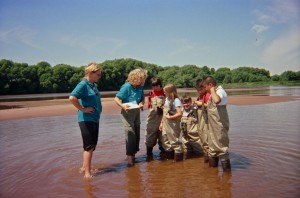Here are resources and curriculum we’ve developed to investigate address issues affecting the sustainability of Lake Superior’s coastal environment and communities.
We are happy to share them with you! Just click on each title to view the curriculum.
Fish Creek Estuary Ed-Venture Curriculum
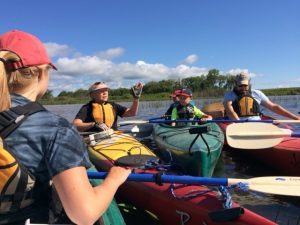 This curriculum takes you paddling through the geology, history, culture and ecology of the Lake Superior’s Fish Creek Estuary without getting your feet wet! This freshwater estuary system, west of Ashland, WI, has been a major player in the history, culture, and economy of the Chequamegon Bay region. Learn why this estuary was the site of a major Native American villages, the landing point for the first European explorers/fur traders, how it was shaped by logging and farming, and why it remains important today. This curriculum can be modified for use in other freshwater estuary and coastal wetland environments. Created by UW-Extension educators Cathy Techtmann and Kathleen Morgen with support from the WI Coastal Management Program.
This curriculum takes you paddling through the geology, history, culture and ecology of the Lake Superior’s Fish Creek Estuary without getting your feet wet! This freshwater estuary system, west of Ashland, WI, has been a major player in the history, culture, and economy of the Chequamegon Bay region. Learn why this estuary was the site of a major Native American villages, the landing point for the first European explorers/fur traders, how it was shaped by logging and farming, and why it remains important today. This curriculum can be modified for use in other freshwater estuary and coastal wetland environments. Created by UW-Extension educators Cathy Techtmann and Kathleen Morgen with support from the WI Coastal Management Program.
Adopt-An-Estuary Curriculum
A 12-series multi-disciplinary curriculum to engage middle school and above students to explore freshwater estuary or coastal wetland systems through art, STEM, mapping and sampling activities. Learners apply this knowledge to identify issues affecting the wetland system and take service learning action to address them. Curriculum units can be used individually or offer a holistic educational program to understand estuaries and coastal wetlands. Created by UW-Extension educator Cathy Techtmann with support from the WI Coastal Management Program.
Paddle Through Time Sustainability Curriculum
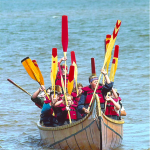
“Paddle Thru Time” program
“Boozhoo! Bon jour! Hello! We greet you in the languages of the Lake Superior region, past and present.” We are happy to share this innovative curriculum explores the relationship between natural resources, economic development, and society’s needs from the pre-European contact days through the fur trade era to today. Originally developed for teaching in the 34-foot “Dreamcatcher” voyageur canoe using “costumed interpretation”, this curriculum takes learners “back in time” to investigate the sustainability of past uses of Lake Superior’s coastal resources. It integrates Ojibwe cultural perspectives and reveals an important choice we are facing if we are to live more sustainability. This curriculum was created by the UW-Extension voyageur team of Cathy Techtmann, Kathleen Morgen, and Elizabeth Post with support from the WI Coastal Management Program and the WI Environmental Education Board. While we no longer offer this program in person, we welcome you to virtually join the Dreamcatcher Brigade to enjoy this curriculum!
Northern Forest Digital Herbarium Website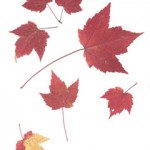
A cool digital library of native and invasive plants of the Ojibwe Ceded Territory of northern Wisconsin. Real life plant images with Latin, Ojibwe, and English name, habitat description, and notes on traditional uses. A great teaching tool. This project was partnership between the Great Lakes Indian Fish and Wildlife Commission (GLIFWC) and UW-Extension. Created by UW-Extension educator Kathleen Morgen and GLIFWC Biologist Karen Danielson with support from the WI Environmental Education Board.
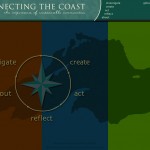 “Connecting the Coasts” Sustainability Web Curriculum
“Connecting the Coasts” Sustainability Web Curriculum
A service learning web-based, service learning curriculum for middle and above learners that investigates critical issues affecting the Lake Superior Region, as identified by the Lake Superior Binational Program in their Lakewide Management Plan (LaMP). Learn how to take action in your community to promote a more sustainable future. Created by UW-Extension educator Cathy Techtmann with support from the EPA.
“Firesouls on the Chequamegon Bay… Passions and Partnerships for Sustainability”
This 15-minute video, produced for the Chequamegon Bay Alliance for Sustainability by UW-Extension educators Cathy Techtmann and Tom Wojciechowski reveals how local citizens collaborated to create a model for community sustainability.
